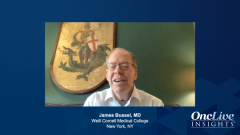
Immune Thrombocytopenia Treatment, COVID, and Other Vaccinations
Physicians share concerns with ITP medications and response to COVID-19 and other vaccinations.
Episodes in this series

James Bussel, MD: Caroline, why do you think the advent of COVID-19 and the pandemic has changed our approach to rituximab, given that it was controversial to begin with?
Caroline Piatek, MD: Rituximab is B-cell depleting, so for at least 6 months after receiving rituximab we could anticipate that our patients would have a decreased response to the COVID-19 vaccine. Because we don’t already have great long-term responses to rituximab, it seems to be falling even further out of favor in ITP [immune thrombocytopenia] in the COVID-19 era.
James Bussel, MD: That’s true, especially thinking about the third shot, the booster shot, is important for Omicron. It’s not like I got my 2 shots, and 2 to 4 weeks after that I received rituximab. It doesn’t matter as much anymore, especially with the questions surrounding how affective the monoclonals and oral agents are that aren’t available for regular use in patients who are infected. There’s been a tremendous decrease in the use of it, which seems quite appropriate.
Craig Kessler, MD: Jim, the other issue is not just the COVID-19 vaccine, which shows decreased responsiveness after rituximab, but also Pneumovax and other vaccines. There may be some differences between childhood ITP and adult ITP in this regard. It’s important to delay the use of rituximab for several weeks to get the patient adequately vaccinated for these various diseases.
Transcript Edited for Clarity







































